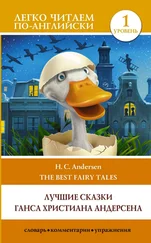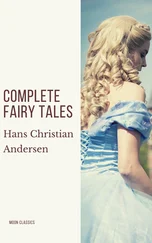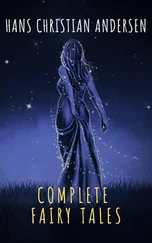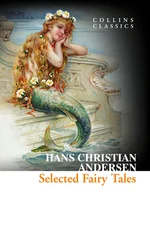Andersen Hans - Hans Andersen's Fairy Tales. Second Series
Здесь есть возможность читать онлайн «Andersen Hans - Hans Andersen's Fairy Tales. Second Series» — ознакомительный отрывок электронной книги совершенно бесплатно, а после прочтения отрывка купить полную версию. В некоторых случаях можно слушать аудио, скачать через торрент в формате fb2 и присутствует краткое содержание. Издательство: Иностранный паблик, Жанр: foreign_prose, на английском языке. Описание произведения, (предисловие) а так же отзывы посетителей доступны на портале библиотеки ЛибКат.
- Название:Hans Andersen's Fairy Tales. Second Series
- Автор:
- Издательство:Иностранный паблик
- Жанр:
- Год:неизвестен
- ISBN:нет данных
- Рейтинг книги:3 / 5. Голосов: 1
-
Избранное:Добавить в избранное
- Отзывы:
-
Ваша оценка:
- 60
- 1
- 2
- 3
- 4
- 5
Hans Andersen's Fairy Tales. Second Series: краткое содержание, описание и аннотация
Предлагаем к чтению аннотацию, описание, краткое содержание или предисловие (зависит от того, что написал сам автор книги «Hans Andersen's Fairy Tales. Second Series»). Если вы не нашли необходимую информацию о книге — напишите в комментариях, мы постараемся отыскать её.
Hans Andersen's Fairy Tales. Second Series — читать онлайн ознакомительный отрывок
Ниже представлен текст книги, разбитый по страницам. Система сохранения места последней прочитанной страницы, позволяет с удобством читать онлайн бесплатно книгу «Hans Andersen's Fairy Tales. Second Series», без необходимости каждый раз заново искать на чём Вы остановились. Поставьте закладку, и сможете в любой момент перейти на страницу, на которой закончили чтение.
Интервал:
Закладка:
Eliza shook her head. She dared not speak, for it would cost her brothers their deliverance and their lives. And she hid her hands under her apron, so that the king might not see how she was suffering.
"Come with me," he said; "here you cannot remain. If you are as good as you are beautiful, I will dress you in silk and velvet, I will place a golden crown on your head, and you shall rule and make your home in my richest castle." Then he lifted her onto his horse. She wept and wrung her hands, but the king said: "I wish only your happiness. A time will come when you will thank me for this."
He galloped away over the mountains, holding her before him on his horse, and the hunters followed behind them. As the sun went down they approached a fair, royal city, with churches and cupolas. On arriving at the castle, the king led her into marble halls, where large fountains played and where the walls and the ceilings were covered with rich paintings. But she had no eyes for all these glorious sights; she could only mourn and weep. Patiently she allowed the women to array her in royal robes, to weave pearls in her hair, and to draw soft gloves over her blistered fingers. As she stood arrayed in her rich dress, she looked so dazzlingly beautiful that the court bowed low in her presence.
Then the king declared his intention of making her his bride, but the archbishop shook his head and whispered that the fair young maiden was only a witch, who had blinded the king's eyes and ensnared his heart. The king would not listen to him, however, and ordered the music to sound, the daintiest dishes to be served, and the loveliest maidens to dance before them.
Afterwards he led her through fragrant gardens and lofty halls, but not a smile appeared on her lips or sparkled in her eyes. She looked the very picture of grief. Then the king opened the door of a little chamber in which she was to sleep. It was adorned with rich green tapestry and resembled the cave in which he had found her. On the floor lay the bundle of flax which she had spun from the nettles, and under the ceiling hung the coat she had made. These things had been brought away from the cave as curiosities, by one of the huntsmen.
"Here you can dream yourself back again in the old home in the cave," said the king; "here is the work with which you employed yourself. It will amuse you now, in the midst of all this splendor, to think of that time."
When Eliza saw all these things which lay so near her heart, a smile played around her mouth, and the crimson blood rushed to her cheeks. The thought of her brothers and their release made her so joyful that she kissed the king's hand. Then he pressed her to his heart.
Very soon the joyous church bells announced the marriage feast; the beautiful dumb girl of the woods was to be made queen of the country. A single word would cost her brothers their lives, but she loved the kind, handsome king, who did everything to make her happy, more and more each day; she loved him with her whole heart, and her eyes beamed with the love she dared not speak. Oh! if she could only confide in him and tell him of her grief. But dumb she must remain till her task was finished.
Therefore at night she crept away into her little chamber which had been decked out to look like the cave and quickly wove one coat after another. But when she began the seventh, she found she had no more flax. She knew that the nettles she wanted to use grew in the churchyard and that she must pluck them herself. How should she get out there? "Oh, what is the pain in my fingers to the torment which my heart endures?" thought she. "I must venture; I shall not be denied help from heaven."
Then with a trembling heart, as if she were about to perform a wicked deed, Eliza crept into the garden in the broad moonlight, and passed through the narrow walks and the deserted streets till she reached the churchyard. She prayed silently, gathered the burning nettles, and carried them home with her to the castle.
One person only had seen her, and that was the archbishop – he was awake while others slept. Now he felt sure that his suspicions were correct; all was not right with the queen; she was a witch and had bewitched the king and all the people. Secretly he told the king what he had seen and what he feared, and as the hard words came from his tongue, the carved images of the saints shook their heads as if they would say, "It is not so; Eliza is innocent."
But the archbishop interpreted it in another way; he believed that they witnessed against her and were shaking their heads at her wickedness. Two tears rolled down the king's cheeks. He went home with doubt in his heart, and at night pretended to sleep. But no real sleep came to his eyes, for every night he saw Eliza get up and disappear from her chamber. Day by day his brow became darker, and Eliza saw it, and although she did not understand the reason, it alarmed her and made her heart tremble for her brothers. Her hot tears glittered like pearls on the regal velvet and diamonds, while all who saw her were wishing they could be queen.
In the meantime she had almost finished her task; only one of her brothers' coats was wanting, but she had no flax left and not a single nettle. Once more only, and for the last time, must she venture to the churchyard and pluck a few handfuls. She went, and the king and the archbishop followed her. The king turned away his head and said, "The people must condemn her." Quickly she was condemned to suffer death by fire.
Away from the gorgeous regal halls she was led to a dark, dreary cell, where the wind whistled through the iron bars. Instead of the velvet and silk dresses, they gave her the ten coats which she had woven, to cover her, and the bundle of nettles for a pillow. But they could have given her nothing that would have pleased her more. She continued her task with joy and prayed for help, while the street boys sang jeering songs about her and not a soul comforted her with a kind word.
Toward evening she heard at the grating the flutter of a swan's wing; it was her youngest brother. He had found his sister, and she sobbed for joy, although she knew that probably this was the last night she had to live. Still, she had hope, for her task was almost finished and her brothers were come.
Then the archbishop arrived, to be with her during her last hours as he had promised the king. She shook her head and begged him, by looks and gestures, not to stay; for in this night she knew she must finish her task, otherwise all her pain and tears and sleepless nights would have been suffered in vain. The archbishop withdrew, uttering bitter words against her, but she knew that she was innocent and diligently continued her work.
Little mice ran about the floor, dragging the nettles to her feet, to help as much as they could; and a thrush, sitting outside the grating of the window, sang to her the whole night long as sweetly as possible, to keep up her spirits.
It was still twilight, and at least an hour before sunrise, when the eleven brothers stood at the castle gate and demanded to be brought before the king. They were told it could not be; it was yet night; the king slept and could not be disturbed. They threatened, they entreated, until the guard appeared, and even the king himself, inquiring what all the noise meant. At this moment the sun rose, and the eleven brothers were seen no more, but eleven wild swans flew away over the castle.
Now all the people came streaming forth from the gates of the city to see the witch burned. An old horse drew the cart on which she sat. They had dressed her in a garment of coarse sackcloth. Her lovely hair hung loose on her shoulders, her cheeks were deadly pale, her lips moved silently while her fingers still worked at the green flax. Even on the way to death she would not give up her task. The ten finished coats lay at her feet; she was working hard at the eleventh, while the mob jeered her and said: "See the witch; how she mutters! She has no hymn book in her hand; she sits there with her ugly sorcery. Let us tear it into a thousand pieces."
Читать дальшеИнтервал:
Закладка:
Похожие книги на «Hans Andersen's Fairy Tales. Second Series»
Представляем Вашему вниманию похожие книги на «Hans Andersen's Fairy Tales. Second Series» списком для выбора. Мы отобрали схожую по названию и смыслу литературу в надежде предоставить читателям больше вариантов отыскать новые, интересные, ещё непрочитанные произведения.
Обсуждение, отзывы о книге «Hans Andersen's Fairy Tales. Second Series» и просто собственные мнения читателей. Оставьте ваши комментарии, напишите, что Вы думаете о произведении, его смысле или главных героях. Укажите что конкретно понравилось, а что нет, и почему Вы так считаете.












